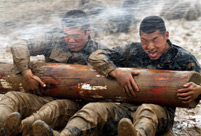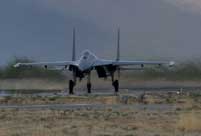 First overseas "China-standard" electric railway laid
First overseas "China-standard" electric railway laid
 College graduate launches organic agricultural cooperative in hometown
College graduate launches organic agricultural cooperative in hometown Guizhou Earthquake Emergency Rescue Team takes part in emergency exercises
Guizhou Earthquake Emergency Rescue Team takes part in emergency exercises Giant Spider-Man appears in Fuzhou
Giant Spider-Man appears in Fuzhou
 Beautiful Chinese-built roads in Africa
Beautiful Chinese-built roads in Africa Sagya Monastery in Tibet
Sagya Monastery in Tibet
 Young Chinese drive consumption
Young Chinese drive consumption
 The life of a model: Not as glamorous as it seems
The life of a model: Not as glamorous as it seems
 Hello Kitty, happy 40th birthday!
Hello Kitty, happy 40th birthday!
 The Western Qing Mausoleum
The Western Qing Mausoleum
BEIJING, May 20 -- Asia is a throbbing continent, not only because of its breath-taking momentum in economic growth, but also in terms of the heart-wrenching stack of security threats it faces.
From Afghanistan to Iraq and to Syria, and from the South China Sea disputes to the Korean Peninsula and Iranian nuclear issues and to the Israeli-Palestinian feud, the world's largest continent is rife with smoking guns and simmering tensions.
Making the picture even grimmer is the unfortunate reality that those conventional security challenges are intermingled with such unconventional ones as terrorism, cross-border crime, natural disasters and cyber-security.
Whether left over from history or stemming from modern geopolitical rivalry, the miscellaneous menaces serve as a stark reminder that a viable way must be found to safeguard Asian security so as to sustain the continent's as well as the world's pursuit of development and prosperity.
That responsibility falls first and foremost on the shoulders of Asians. Asia is the home of Asians, and Asian security immediately concerns their vital interests. Thus it is an inherent and inescapable duty of Asians to keep their own courtyard in order.
And Asian nations are capable of fulfilling that sacred mission. They share boundaries and histories, they understand their own fundamental and strategic interests, and, more importantly, more and more of them are joining hands for common security.
The mounting attention on the Conference on Interaction and Confidence Building Measures in Asia, a pan-Asian security mechanism whose fourth summit opens in Shanghai on Tuesday, is a vivid embodiment of Asian nations' shared will.
The joint commitment is particularly imperative against the backdrop of a security environment that subjects Asia to multiplying uncertainties as outside players are scrambling to maintain their interests in the dynamic continent.
The increasing assertiveness of certain claimants in the South China Sea disputes to the accompaniment of the U.S. rebalancing to Asia has already sounded the alarm.
Meanwhile, the collective determination is also of extraordinary significance as security cooperation is an undisputed short slab in regional collaboration. It is high time that Asian nations took concrete measures to boost dialogue, deepen mutual understanding and cement strategic trust.
The primary role of Asians in safeguarding Asian security does not mean that outsiders should be prohibited from playing any part in Asian affairs. Asia belongs to Asians, but it also belongs to the world.
The era of the Monroe Doctrine is a long-gone chapter of history; the increasing global interdependence today makes a mockery of any attempt of any country -- not to mention the most populous continent on the planet -- to cocoon itself from the rest of the world.
Yet in order to maintain Asian security and vitality, players from other parts of the world need to play a constructive role. They should refrain from starting fires and stoking flames. Instead, they should help ease tensions and promote good faith.
After all, a peaceful and prosperous Asia benefits not only its own inhabitants but also all others sharing the same planet.
 A bite of Jiang Nan
A bite of Jiang Nan PLA's tough exercises
PLA's tough exercises Best photos of the week
Best photos of the week  When we are young...
When we are young... Wedding photos of world champion
Wedding photos of world champion "The Most Beautiful Chinese Land"
"The Most Beautiful Chinese Land"  Men experience pains of childbirth on Mother's Day
Men experience pains of childbirth on Mother's Day  J-11 fighters training in complex meteorological conditions
J-11 fighters training in complex meteorological conditions Six years after Wenchuan earthquake
Six years after Wenchuan earthquake  8 great movies to watch with your mom
8 great movies to watch with your mom China's most luminous celebrities
China's most luminous celebrities Newly recruited police in Hetian hold drill
Newly recruited police in Hetian hold drill  Bird-men compete flying in Hong Kong
Bird-men compete flying in Hong Kong  The 'Chinese Dad'
The 'Chinese Dad' Shanghai locals bid farewell to childhood memories
Shanghai locals bid farewell to childhood memoriesDay|Week|Month